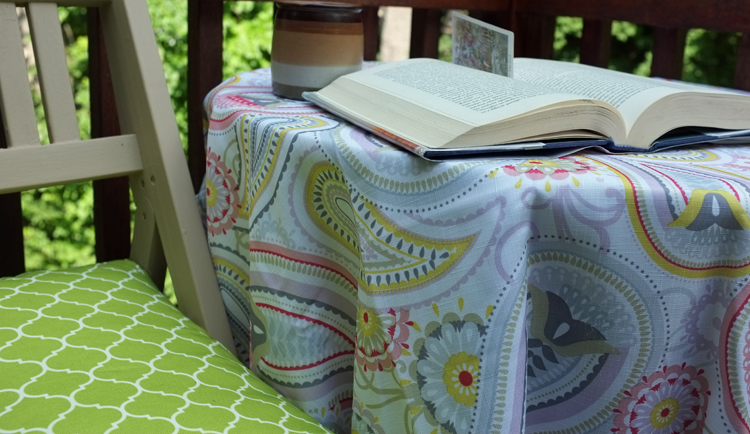 I just finished been reading Margaret Fuller: A New American Life by Megan Marshall this weekend, because my family allowed me an evening at home by myself while everyone went to the lake for a swim and play. I don’t have that kind of time often anymore, because it appears that taking care of two kids is enough work for two parents (and two grandparents) and nothing less. Of course, things will change and this little baby grows more independent, but until then you probably should be prepared that I’ll complain about my lack of time non stop. Because it’s hard. It’s very very hard.
I just finished been reading Margaret Fuller: A New American Life by Megan Marshall this weekend, because my family allowed me an evening at home by myself while everyone went to the lake for a swim and play. I don’t have that kind of time often anymore, because it appears that taking care of two kids is enough work for two parents (and two grandparents) and nothing less. Of course, things will change and this little baby grows more independent, but until then you probably should be prepared that I’ll complain about my lack of time non stop. Because it’s hard. It’s very very hard.
Anyway. I read this biography of Margaret Fuller, nineteenth century writer, woman of amazing culture and intellect who counted among her friends people like Ralph Waldo Emerson, Nathaniel Hawthorne, and Henry David Thoreau, and I was left with many buzzing thoughts. So annoying that I have to put them down in writing.
All these men that she knew and collaborated with have become celebrated figures of literature and history and, while oftentimes they admitted to Margaret Fuller’s intellectual superiority, she was the one who history decided to leave in the shadows. She wrote a treatise about the condition of women Woman in the Nineteenth Century, in which she argues that women should not devote themselves to marriage and family as they do, because it limits them, and they never get a chance to become what they should become. She thought that women need to be educated and find employment that suits their skills, instead of working in the house. She is basically against marriage, unless it is one of equals, which was a very rare thing in that time and remains quite often hard to achieve even today. She also wrote extensively for the New York Tribune, for which she covers that revolutions in Europe and particularly Italy in 1846 to 1849.
She was quite a figure and yet I hadn’t heard of her before two weeks ago when a friend recommended that I read this book. True, I am not very knowledgeable of American history or literature, but I had heard of Emerson, Thoreau and Hawthorne, so . . . yeah, if there was any fairness, I would have known Margaret Fuller’s name too, and when my daughter asked me last year about a notable woman that she could read about for a school assignment maybe I would have given her this name. Instead my daughter learned about the Abigail Adams who “didn’t really do anything interesting, mami!”
I used to respond to questions of why doesn’t history mention more extraordinary women by showing the person (usually a man, to say the full truth) that women did not have access to education and they were not allowed to be active in the public sphere even if they did somehow become highly educated. Now I realize that even if one managed to overcome all these obstacles, her achievement, no matter how extraordinary, would simply be overlooked by history, because how great can a woman be? Not that great. Just all right, for a woman, I guess. Sad. Very sad, dear humanity! I feel embarrassed for you.
(I have illustrated this post with a photo on my newly “redecorated” backyard deck. The cafe table and its chairs got a new coat of paint and new fabrics to cover them. I made the chair cushions myself from old sofa pillows and a new indoor/outdoor tablecloth. The deck suddenly became a biggish attraction for the whole family, when just a few days ago, and for most of the summer, it was just a hangout for recyclables, trash, dirty diapers, and, at night, adorable racoons. P.S. No, I don’t expect history to note my tableclothing skills, as phenomenal as they clearly are.)



Please forgive my hideous apostrophe error, blimey, what was I thinking?! I need to not comment on blogs when tired!!
Also, autocorrect may be sabotaging my career…. 🙂
Well, Lori, if you decide never to write another novel, you’ve a career as a homes & gardens designer /photo shoot – ma-bob just waiting for you. You have a great eye (and excellent tablecloth skills – I appreciate the skills!)
Father’s and their influence on daughters is interesting. I just re-read Alison Bechdel’s Fun Home. The ending makes me cry every time.
Thank you, Rachel, for appreciating my skills! I knew you would. And yes, I am sure a design career would be an answer for me 🙂
I’m just shy of halfway through the book still, but it really is striking how little return she’s able to get on so much ambition and genius in comparison with her male peers, even with all of the class and financial benefits with which she was born. And how differently Emerson treats her just because she’s a woman even though he says he values her intellect (there’s always been something annoying to me about Emerson). I’m trying not to find it discouraging. I wish I didn’t already know the end of the story.
I’m also feeling a little bit of a kinship with Margaret’s father, who focussed so much on her unconventional (for a woman) education that he turned Margaret into something of an odd duck. My dad raised me in a similar way, and I suspect I’m doing the same to my kids. But then, I think we’ve been odd ducks for longer than three generations so maybe I’m just carrying on a family tradition.
Emerson seems to have treated all the women in his life rather poorly. He was too self-involved and he didn’t really know what to do of these intellectually accomplished women. He tried to accept them, though, which is more than others did at the time, I think.
It is so interesting that you can draw similarities with your own life. I think many women of genius had the support of enlightened fathers who didn’t limit their horizons. Although I’m sure the opposite is true also: many women have raised above their traditional upbringing and in spite of it. But it must be an advantage to have a father who sees you as a person, not as a girl. I think my dad treated my sister and me like boys because he didn’t get to have a boy. Something to think about.